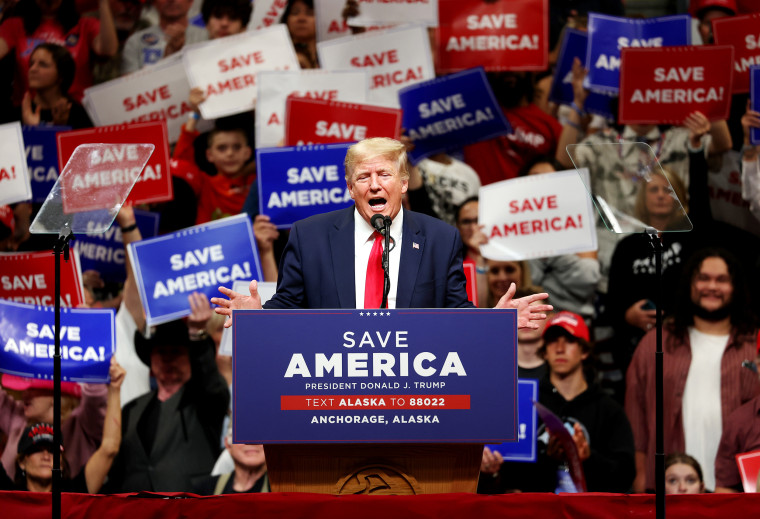Donald Trump’s list of legal troubles is amazingly long. The Republican is currently facing a criminal investigation, for example, for having brought highly sensitive classified information to his glorified country club and refusing to give it back. There are also criminal and civil allegations surrounding Trump’s role in the Jan. 6 attack and the broader effort to overturn an American presidential election.
But that’s just the start. As regular readers know, the former president’s business is also facing multiple fraud investigations. There’s also an ongoing criminal investigation in Georgia related to his efforts to interfere with election results. There’s also an apparent criminal investigation surrounding his special purpose acquisition company (SPAC).
At least Trump can take some comfort in knowing things can’t get worse, right? It’s not as if federal prosecutors might open an entirely new line of inquiry, right? Well, as it turns out, The New York Times published this report earlier today that a federal grand jury is examining the formation of — and spending by — Trump’s super PAC.
According to subpoenas issued by the grand jury, the contents of which were described to The New York Times, the Justice Department is interested in the inner workings of Save America PAC, Mr. Trump’s main fund-raising vehicle after the election. Several similar subpoenas were sent on Wednesday to junior and midlevel aides who worked in the White House and for Mr. Trump’s presidential campaign.
According to the Times’ report, which has not been independently verified by MSNBC or NBC News, the new subpoenas were apparently issued by a grand jury separate from Jan. 6 grand jury. The article went on to note, “At least one of the new subpoenas bore the name of a veteran federal prosecutor in Washington who specializes in fraud cases, suggesting that this avenue of inquiry is devoted primarily to examining the spending and fund-raising at Mr. Trump’s super PAC.”
The specific details surrounding the investigation are not yet known, but if federal investigators are examining the former president’s post-defeat fundraising, there’s plenty of evidence to consider.
Circling back to our earlier coverage, it was in December 2020 when Trump’s operation pushed an avalanche of lies about the outcome, telling unsuspecting donors that their money would go toward challenging the election results that the then-president falsely claimed were illegitimate. The pitches were incredibly successful, at least insofar as they raised an enormous amount of money.
But it was the latest in a series of Trump grifts: Contributors’ money wasn’t going toward pointless recounts, silly audits, and hapless lawsuits. Rather, most of the funds went to the Save America PAC — derided by campaign-finance experts as “essentially a type of slush fund, with few restrictions on how the money they raise can be spent.”
After Trump left the White House, things got worse: The former president kept lying about the election, causing his followers to keep donating. One appeal last year told prospective donors, “We need you to join the fight to SECURE OUR ELECTIONS!” but none of the millions of dollars raised by Save America went toward any such efforts.
This took on new significance a few months ago when the House select committee investigating the Jan. 6 attack held one of its public hearings and highlighted Team Trump’s “Official Election Defense Fund.”
As one former Trump campaign staffer told the bipartisan congressional committee, “I don’t believe there is actually a fund called the ‘Election Defense Fund.’”
As we discussed soon after, the bulk of the money went to the former president’s super PAC.
Part of what made this jarring was the degree to which it was a scam wrapped in a scam: Trump started with a lie — the election results were illegitimate — and then added another lie on top of it, by telling those who believed the first lie to go grab their wallets and contribute to Election Defense Fund that had nothing to do with defending elections.
It also created a perverse set of incentives: The moment the Republican stopped lying was the moment donors stopped sending him money, which not surprisingly encouraged Trump to keep the con going.
But there was also a legal dimension to this: Aren’t there laws against unscrupulous conmen launching fraudulent scams?
Rep. Zoe Lofgren, a Democratic member of the Jan. 6 committee, was asked about this after a hearing in June. “It’s clear that he intentionally misled his donors, asked them to donate to a fund that didn’t exist and used the money raised for something other than what he said,” the congresswoman told reporters.
Lofgren added, “Now it’s for someone else to decide whether that’s criminal or not. That’s not the purview of a legislative committee.”
It’s against this backdrop that a federal grand jury is reportedly taking a closer look at Trump’s operation and its dubious fundraising. Watch this space.

